Las Malvinas or the Falkland Islands? The Ugly Face of British Imperialism and Its Startling Cost
With regard to the Falkland Islands, also known as Las Malvinas, the ugly faces of colonialism have once more raised their heads above the parapet. In doing so they have presented an invitation to take a metaphorical pop at them that is impossible to resist. On January 3, 2013, Argentina’s President Cristina Fernández de Kirchner published in The Guardian a letter addressed to David Cameron in which she strongly questioned the integrity of Britain’s claims to the islands.[i] The next day The Sun newspaper — Murdoch’s seedy tabloid that is notorious for its screaming headline ‘GOTCHA’ when the General Belgrano was sunk in the Falklands conflict of 1982 with a concomitant loss of at least 321 lives — published a letter in the Buenos Aires Herald stating what it considers to be the British case.[ii] To imperialists, the loss of life in a conflict is unimportant, providing it is not one of their own, and it is of little concern to them that 255 British servicemen and women were killed in what we call the Falklands’ War. Their names are listed in this footnote.[iii]
It is almost 31 years since General Galtieri’s armed forces invaded the Falklands. Back then Margaret Thatcher’s popularity was well on the wane, and she saw this conflict as an opportunity to re-establish populist consensus, which regrettably proved correct. Harold Macmillan had seen the decline of the British Empire due to the burden it was costing us financially. Thatcher thought there was some kind of gold pot 8000 miles away and concluded that there would be long-term benefits in keeping the Falkland Islands under the United Kingdom’s control. Others in her party were not as convinced by this logic, and a distant relative of David Cameron, Ferdinand Mount, wrote a piece in The Spectator that gave some conservative estimates as to what the burden might be on the UK taxpayer. One of the things he pointed out was that the islanders rarely owned their homes, and most were tenants of the Falkland Islands Company. He also noted that only those of working age were likely to stay on the islands, whereas those too old to work, and young people, tended to emigrate, and there was a falling population.[iv]
Mount’s biggest argument for not going to war was the financial burden of doing so. Based on Keith Speed’s estimate, patrol of the islands would cost the UK taxpayer £20 million per annum. Mount postulated that this was a gross underestimate.[v] The figure, which has been falling over the last five years, was £69 million in 2010-11, less than half of what it was in 2005-06.[vi] Yet this, unbelievably, is one and a half times as much as the total gross domestic expenditure of the islands, which currently stands at about £46 million.[vii] In Mount’s well-reasoned argument for not going to war purely on financial grounds, he makes a calculation that each family on the islands would cost the UK taxpayer £40,000 per year. While quite a few of us would not mind earning that kind of money, the total cost per family today is closer to £92,000, having been reduced since 2005-06 due to a cut in military expenditure from above £180,000 per family per year.[viii] If you are a UK taxpayer, you should be asking whether this makes sense while unemployment is rising and wages are falling for the majority of UK citizens.
Of course, there might be some long-term returns for private individuals who have invested in Rockhopper Exploration and Premier Oil plc, but they are likely to get the same returns whether the Falklands are under UK or Argentinian control.[ix] Even then, there are no guarantees. The South Atlantic can be rough, and offshore spillage disasters are perhaps as much of a probability as any great financial returns. In any case, none of this wealth comes back to the ordinary UK taxpayers who are collectively funding the “protection” of the islanders.
Since the Falklands War, the UK taxpayer has funded, among other things, a new airport with a longer runway than that at Port Stanley. This is located at the military facility at Mount Pleasant. Together with a road linking it, the construction was budgeted at £215 million, or put another way, more than £300,000 per Falklands family.[x] In its typical “Hands off our territory” open letter published on January 4th, The Sun quite rightly refers to a referendum of Falkland Islanders scheduled for March, though its history of colonization of the islands is sketchy. The question being asked is whether the islanders wish to remain under British control. If a foreign power 8,000 miles away is lavishing its taxpayers’ hard-earned money on improving and protecting the islands to the degree the UK has been doing, with presumably an open checkbook to continue funding perpetually, this checkbook diplomacy might be inclined, one would think, to sway the opinions of the indigenous population. It might be reasonably assumed that they would consider themselves British through and through. But do they?
According to a Guardian fact chart, when the islanders were asked how they identified themselves, 29 percent considered themselves to be British, 9.8 percent considered themselves to be of St Helena identity, 5.4 percent Chilean, and a whopping 59 percent considered themselves to be Falkland Islanders.[xi] So British taxpayers’ funds only bought a modicum of loyalty. Margaret Thatcher made a terrible mistake and should have listened to Ferdinand Mount. Unfortunately colonialists do not count the cost either in human terms or in financial terms. Argentina’s president, in her own way, is as imperialist as Thatcher. Other land in Antarctica, which William Hague recently renamed Queen Elizabeth Land, and which is twice the size of the UK, is a vast area, part of which is also contested by Argentina. What is more, the segment of ocean which the UK lays claim to is even larger than the land area.[xii] The saber-rattling continues.
This calls into question how any state can claim land on the basis of simply going there and sticking a flag in the ground. Countries which have laid claims to the Falkland Islands and raised their standards there are: France (1764), Britain (1765-76), Spain (1767-1811), and a whole host of claims and counter-claims to the territory, sometimes with several countries simultaneously occupying the islands.[xiii]
Who has the best case in law? The populace of the Falkland Islands will almost certainly vote to remain under British control, since English is the official language of the islanders. The vote will only confirm that the Falkland Islands are English-speaking, like New Zealand or Canada. As with New Zealanders and Canadians the majority of those who live on the Falklands consider themselves to be Falkland Islanders. Before the UK spent so much of taxpayers’ money on improving conditions for the islanders, Argentina had the best legal case and several times tried to establish its claims under international law. These were simply ignored. The improvements and commitment to defend the islands have strengthened the UK case. On the other hand, contiguously, the islands belong to Argentina. Looking at it from Argentina’s point of view, the British position is a bit like China laying claim to the Isle of Man, for example.
A major problem with the referendum is that the wrong question is being asked. Furthermore it is being asked of the wrong people. The Falkland Islanders should not be asked if they wish to be considered British or Argentinian. Instead UK taxpayers should be asked if they want to continue funding every family on the Falkland Islands to the tune of almost £92,000 every year.
UPDATE
On Sunday and Monday March 10-11, 2013 a vote takes place asking the Falkland Islanders if they want the UK taxpayer to continue forking out almost £100,000 per annum for every family living on these desolate isles, when at home we have a massive unemployment problem and other important underfunded issues. No doubt the answer will be “Yes”, and this is understandable from the point of view of those who live there. When free gifts of such ample proportions are offered without ties, except a declaration of loyalty to the crown, it is a no-brainer. This funding, and much more has been going on for over 30 years.
Two months ago, in the New Junkie Post article reproduced below, it was argued that the wrong question was being asked of the wrong people. UK taxpayers should be asked if they want to continue funding the lives of people they will most likely never meet on islands 8,000 miles away, from which there is no return. Argentina, which is much closer to the islands and has long claimed sovereignty over what it calls the Malvinas, has its own viewpoint. The vote is irrelevant, since it does not take into account the interests of Argentina.
The Argentine ambassador to London, Alicia Castro, claims the vote is simply a diversionary tactic to stop the UK from engaging in pre-agreed talks between the UK and Argentina to be overseen by the United Nations. Castro also claims that Argentina is being presented as a persecutor even though the civil and political rights of islanders have been respected. The islander newspaper, Penguin News, leads with “Falklands prepares for Press Invasion.”
References
[i] http://www.guardian.co.uk/uk/2013/jan/03/david-cameron-falkland-islands-argentina
[iii] http://www.britains-smallwars.com/Falklands/roh.html
[iv] http://blogs.spectator.co.uk/coffeehouse/2012/04/from-the-archives-defending-the-falklands/
[v] Ibid.
[vii] http://www.guardian.co.uk/news/datablog/2013/jan/03/falkland-islands-data-charts
[viii] Ibid. These figures were calculated and rounded by assuming a family of 4, with a population of 3,000 and a military expenditure of £69 million per annum (rounded).
[ix] http://en.wikipedia.org/wiki/Rockhopper_Exploration
[x] http://www.falklands.info/history/histarticle33.html
[xi] http://www.guardian.co.uk/news/datablog/2013/jan/03/falkland-islands-data-charts
[xiii] http://en.wikipedia.org/wiki/History_of_the_Falkland_Islands
Editor’s Note: All photographs by Elizabeth Oliver.
Related Articles


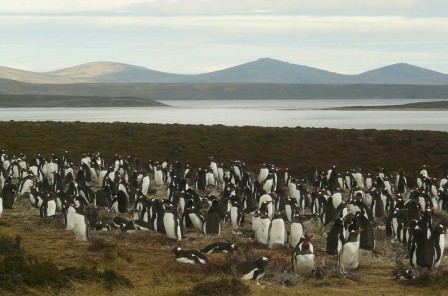
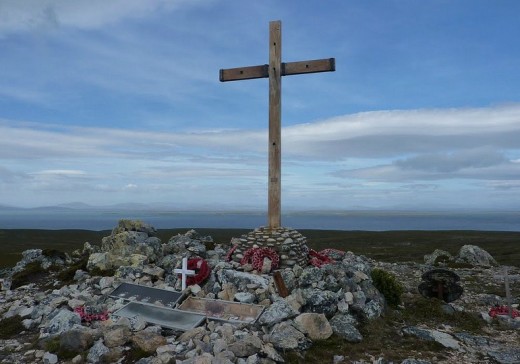
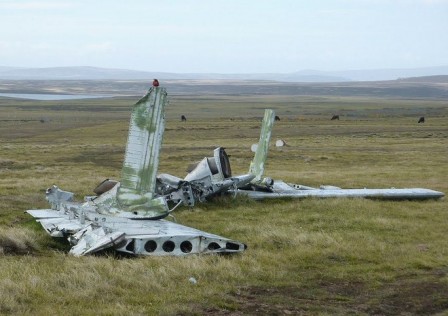
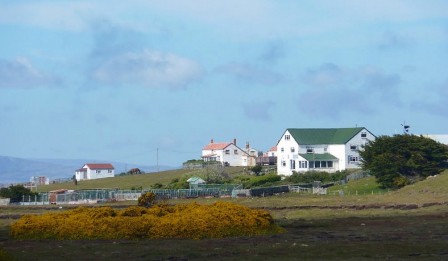
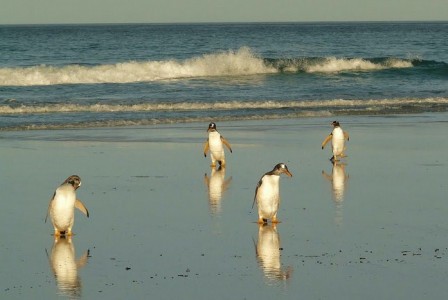
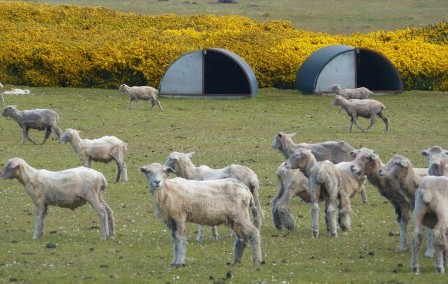
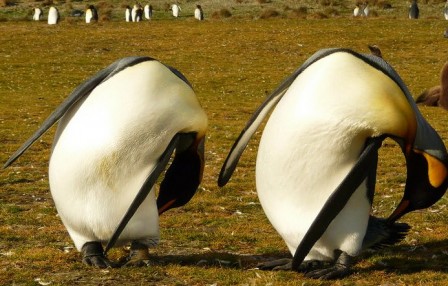
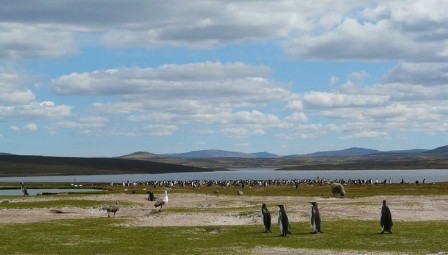











21 Responses to Las Malvinas or the Falkland Islands? The Ugly Face of British Imperialism and Its Startling Cost
You must be logged in to post a comment Login